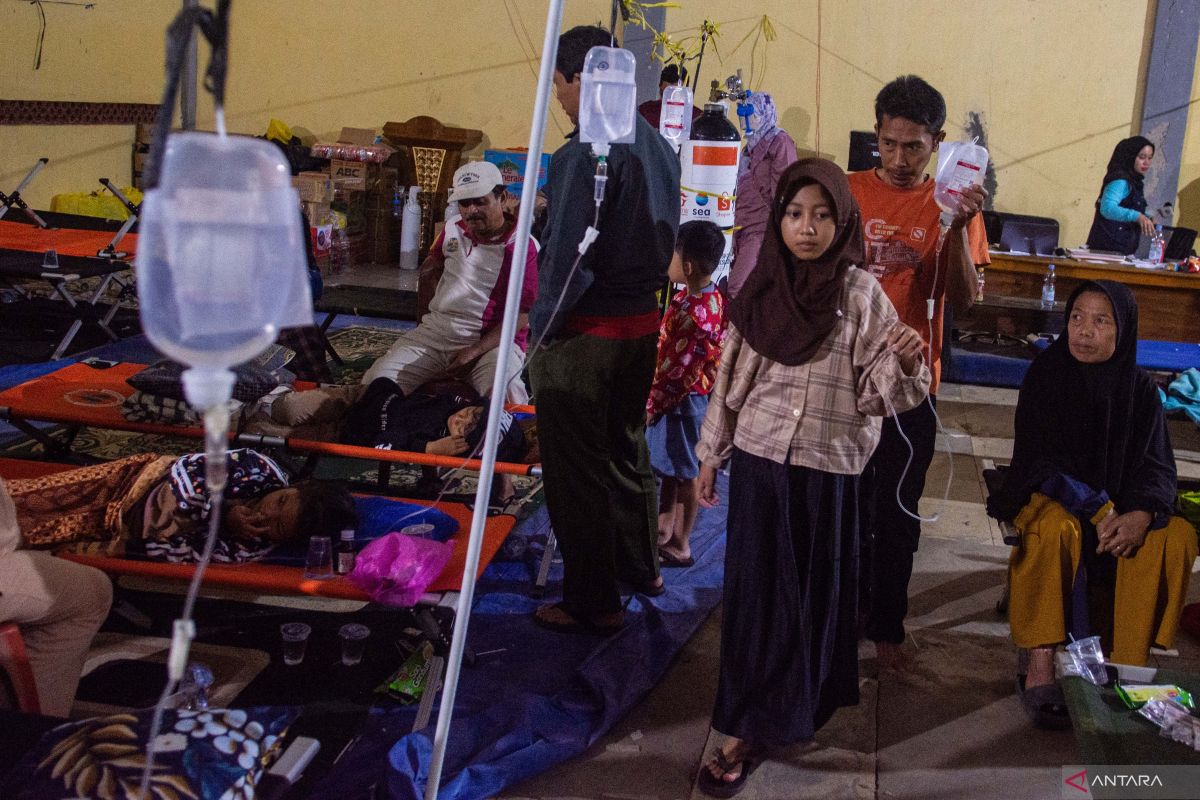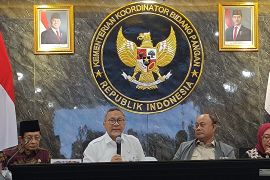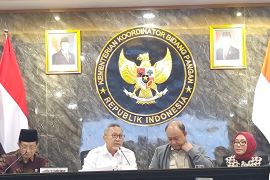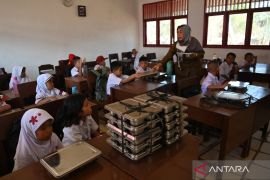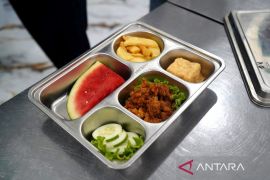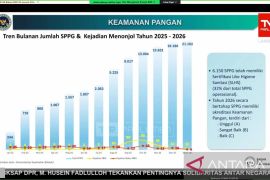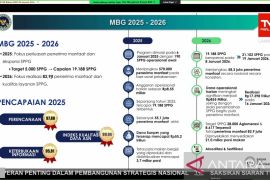Improvements must address not only SPPG operations and capacity but also coordination across procurement, cooking, distribution, and quality control.Jakarta (ANTARA) - Under President Prabowo Subianto’s leadership, the Indonesian government officially launched the Free Nutritious Meals (MBG) program on January 6 this year.
The president has declared the initiative a top national priority with one ambitious goal in mind: improving the nutritional intake of all school-age children across Indonesia.
The program, however, is not limited to children.
In pursuit of high-quality human resources, the government has allocated substantial funds to ensure that MBG also benefits breastfeeding mothers, pregnant women, and toddlers.
President Prabowo has repeatedly emphasized that fulfilling the nutritional needs of these groups is vital to creating a golden generation capable of driving the nation forward.
So far, MBG has already reached more than 30 million beneficiaries nationwide, supported by the establishment of around 10,000 special kitchens officially called Nutrition Fulfillment Service Units (SPPGs). Despite its massive scale, however, the program has recently come under public scrutiny—not for its reach, but for troubling reports linking it to food poisoning in several regions.
The most notable case occurred in September 2025, when more than a thousand people reportedly suffered health problems after consuming MBG meals in West Bandung District, West Java.
It marked the largest incident since the program’s launch and triggered nationwide concern.
Subsequent laboratory examinations revealed that meals had degraded and become inedible by the time they reached recipients. This finding reinforced public allegations that implementation of the flagship program remains marred by flaws in several areas.
Dadan Hindayana, Head of the National Nutrition Agency (BGN)—the body responsible for executing and overseeing MBG—confirmed that most food poisoning cases stemmed from SPPGs failing to comply with agency standards, particularly in food procurement, cooking, and distribution timelines.
While the BGN requires kitchens to process ingredients within two days of procurement, some were found delaying until the fourth day.
Worse still, several kitchens reportedly took up to 12 hours to cook and distribute meals, far exceeding the standard four to six hours.
Related news: MBG poisoning linked to SPPG's failure to follow SOPs: BGN
Evaluation responses
These shortfalls prompted the government to hold a press conference on September 28, announcing measures in response to public concern. Among the steps were requiring SPPGs to obtain hygiene and sanitation certificates, conduct food safety tests prior to distribution, suspend problematic kitchens, mobilize health centers for stronger supervision, and evaluate cooks.
Nutritionist Mochammad Rizal, currently pursuing a doctoral degree in nutritional science in New York, told ANTARA that MBG meals must reach recipients promptly after cooking to prevent bacterial degradation.
He pointed to long distribution distances, the lack of temperature control in transport vehicles, and mismatches between kitchen capacity and demand as key factors behind recurring problems.
“Enclosing food while it is still hot accelerates degradation, but leaving it exposed too long raises the risk of bacterial and viral contamination,” he explained.
Rizal stressed that the complexity underscores the need for a comprehensive overhaul of the program.
Improvements must address not only SPPG operations and capacity but also coordination across procurement, cooking, distribution, and quality control. Stronger management is considered essential to prevent further cases of spoiled meals and food poisoning.
Ideally, SPPGs should operate with clear divisions of labor and be handled by qualified workers who undergo proper training.
Such an approach would strengthen organizational structure and ensure consistent adherence to food safety standards—crucial if MBG is to fulfill its mission of enhancing nutritional intake.
Equally important is aligning workforce capacity with production demand. In some regions, a single nutritionist has been tasked with overseeing thousands of meal portions daily—an unrealistic workload.
“Nutritionists aren’t just designing menus. They must also check ingredient quality, monitor cooking, and supervise distribution. Doing all that alone is impossible without reliable support teams,” Rizal stressed.
This imbalance, he argued, has led to inconsistent implementation of balanced diets across regions. Social media posts highlight uneven nutritional standards, with some citing budget limitations and others pointing to limited access to food supplies in certain areas.
Either way, a one-size-fits-all approach appears impractical for a program spanning such a vast and diverse country.
Related news: Gov't to gauge MBG impact with nutrition status in free health checkup
Balanced diets
On the subject of balanced diets, Rizal emphasized that MBG meals must avoid ultra-processed foods and instead deliver proportional carbohydrates, protein, and nutrients from animal, vegetable, and fruit sources.
He also noted that meal portions should be tailored to recipients’ age groups, as the requirements of elementary school children differ from those in junior or senior high schools.
“It is indeed challenging to mass-produce meals and still adjust portions to age groups. That’s why we need clear portion standards,” he said.
Beyond logistics and nutrition, the program must also contend with beneficiaries’ eating habits.
Many Indonesian schoolchildren are accustomed to instant snacks and ready-made foods. Serving them healthy meals every day, while necessary, risks discouraging them and could lead to waste if menus feel unfamiliar.
Rizal suggested that instead of abrupt changes, the government should gradually move toward its nutritional standards for MBG.
“We can start from simple, family-style menus that children are familiar with,” he said, while recommending continuous nutritional education.
This way, he argued, students can gradually adapt to healthier meals without feeling alienated. Such a strategy would help curb waste and foster a culture of healthy eating.
While numerous steps to improve MBG delivery have been proposed, one central idea remains: the program’s success depends on synergy. Effective execution requires collaboration not only among government institutions but also between authorities, businesses, experts, and the broader public.
If such cross-sector cooperation is achieved, Indonesia stands a stronger chance of realizing MBG’s ultimate promise—nurturing a generation that is healthier, stronger, and more competitive, bringing the nation closer to its golden era as a developed country.
Related news: Prabowo orders safety tests at MBG kitchens amid poisoning outbreak
Related news: Komnas HAM to probe free meal program after food poisoning cases
Related news: Food safety alert: Ombudsman calls for tighter oversight of MBG
Editor: M Razi Rahman
Copyright © ANTARA 2025
